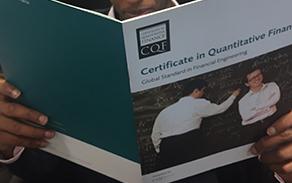Q&A with a Quant: Ru Ding
February 2022

As an algorithm engineer at one of China’s largest fintech companies, Ru Ding works in a team that uses big data and AI technology to understand financial users and assets – to manage credit risk and customer lifecycles through anti-fraud and marketing models.
We spoke to Ru Ding to find out about life as a quant in Beijing.
Tell us a little more about the work that you do?
My team focuses on user research – which includes studying their interests, intentions and other behaviours such as risk. One of the most interesting aspects of work is quantifying users risk aversion from the perspective of behavioral finance. The second area of our research focuses on asset pricing which includes funds and stocks. Simply put, it is to quantify the impact of an asset’s historical price performance on another asset’s future price performance.
What are some of the biggest achievements in your work to date?
My biggest achievement to date has been the creation of an improved version of the Bayesian Network – which is an alternative approach to learn about the causal relationships between different companies and stock prices. The Bayesian approach is very useful for taking an event that occurred, and predicting the likelihood that any one of several possible known causes was the contributing factor.
Academic / Professional Qualifications
University of Chinese Academy of Sciences
Master – Management Science and Engineering, 2015 – 2018
Wuhan University
Bachelor – Information Management and Information Systems, 2011 – 2015
Fitch Learning
Certificate in Quantitative Finance (CQF), 2021
What have been are the biggest challenges so far?
Ha ha, you know, it was not a work-life balance challenge, but a work and study issue. As an algorithm engineer, I need to constantly update my professional skills, and work hard to realize the application of technology in business. Trying to arrange to study for the Certificate in Quantitative Finance (CQF) while working at the same time, that was really the biggest challenge for me.
What do you enjoy and dislike most about your job?
Real business problems are very complex. I have a big passion in trying to convert these abstract business issues into mathematical problems and design a code to solve them. This is the most challenging part of my job. But when I solve a problem by combining my knowledge from different disciplines such as psychology, mathematics and finance and so on, this always gives me a very strong sense of happiness.
Why did you decide to pursue this role?
Curiosity! I want to know more about the world around me as I have a special interest in the relationship between behavioural psychology and finance. This position also allows me to know more about myself. I am usually confident about my own ideas. However, working in quantitative finance provides me with an opportunity to push and explore my assumptions as it has a clear criterion to test whether I am right or wrong.
Where do you see yourself in terms of your career development 5, 10 or even 20 years from now – if you can look that far ahead?
It’s a hard question to answer especially since I’m in the early stage of my career. But I think once I have made a heartfelt decision on a direction to take, I would like to stick to that path no matter what happens.
What is your view on the state of quantitative finance in China, and what are the implications for quantitative finance professionals and those who are seeking a career in the industry?
Quantitative finance is developing absolutely at such a high speed in China. This means many career opportunities in this sector. So, if you want to join this industry, you must equip yourself with the skills required for these roles. When I was a risk management algorithm engineer, I chose to enroll in financial risk management (FRM) training to gain some professional knowledge. Now I am committed to improve investment and research capability with AI. The CQF has provided me with confidence as you are able to experience many problems during the training. It is important to keep your questions in mind and maybe you can find the answer.
What in particular is interesting about quantitative finance?
You have an idea, then code to realize it. How would you feel if your idea could make money from the capital markets?
What in your opinion are the skillsets that are required to be successful in quantitative finance?
Again - curiosity would be key. This would help you to find interesting problems to resolve through a quantitative method. Also, professional skills are important to enable you to deal with the problem; and finally, a good state of mind to keep yourself happy.
You previously earned the Certificate in Quantitative Finance (CQF). Where did the CQF add value in your career path?
Professional knowledge. As an algorithm engineer in fintech, you tend to have frequent contact with other so-called financial engineers – professionals for example in data science, quantitative risk management and portfolio construction – who use mathematical and statistical analysis to determine the value of financial assets such as bonds, stocks or options, and who then use this historical data to develop trading algorithms and computer models. The CQF enables me to communicate with them in a more confident and professional manner.
How important is continuous learning for you to achieve your career goals?
Very important, but you have to know what your needs are and then pursue the specific training to fulfil these gaps.
Who do you admire in the world of quantitative finance – or in your industry?
James Simons and Paul Wilmott. Simons is one of the world’s top quant investors - the founder of Renaissance Technologies. His quote that “Certain price patterns are non-random and will lead to a predictive effect” has been a guide to me when design my predictive models. As for Wilmott, he is one of the world's leading financial mathematicians – the founder of the CQF, who has given many people like me an opportunity to learn about quantitative finance from the world’s most famous experts. You can feel the sense of happiness and freedom from him when he talks about quantitative finance, which is the state I want to pursue.
About the CQF
Founded by Dr. Paul Wilmott and exclusively delivered by Fitch Learning, the CQF is the world’s largest professional qualification in quantitative finance. The six-month program focuses on teaching the analysis and implementation of quantitative models and techniques used in today's financial markets. Delivered part-time and online, the CQF is aimed at professionals who want to advance within their field by gaining practical quantitative finance and advanced machine learning skills. CQF alumni can also continue their professional development and keep up to date with the latest CQF syllabus throughout their careers with permanent access to the CQF Lifelong Learning Library.




